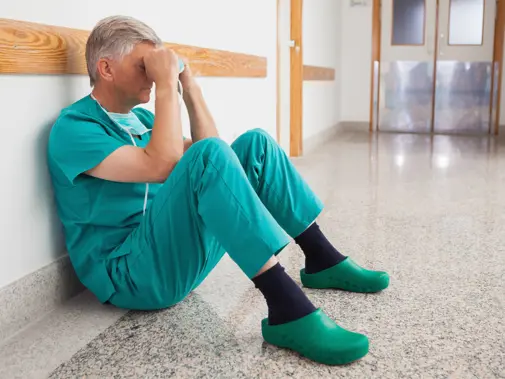In the last decade or so, there has been an increasing sense of unease among the medical profession.
There was no particular moment to point to for NHS staff, no common public acknowledgement of this rising issue, and yet slowly but inexorably there has been mounting evidence of it for years.
Challenging to name, difficult to explain, and impossible to quantify there is a prevailing belief that working in healthcare in the UK has steadily become more demanding.
This has led to what is increasingly being recognised as moral distress among healthcare staff. Moral distress arises when structural or systemic constraints result in actions that contradict one’s moral values. The individual in question does not have to undertake the action, they could also witness it in a colleague.
Typical emotional responses to moral distress include feelings of guilt, shame and disgust. If moral distress is sustained it can lead to moral injury, which is a more profound and pernicious harm that can open the door to serious mental health conditions.
The concept of moral distress has most commonly been applied to battlefield medicine where exposure to unpredictability and extremity is common. It entered mainstream medicine via nurses and their lack of agency in their professional environment.
There has been a slow building recognition though of how pertinent this is to doctors. The distress caused by exposure to suffering is not, in and of itself, moral distress.
However, sustained constraints on doctors, whether through structural and bureaucratic barriers or the rationing of resources (from equipment and medicine to time and staff) can generate the sense of frustration and powerlessness that is synonymous with moral distress.
Doctors do their best for their patients, but they increasingly find a system which places limits on what their best can be. This has not over happened overnight and has been one of the gradual, incremental changes that has been building in the NHS over a number of years.
Perhaps the only silver lining of COVID-19 is that it has brought into sharp focus the issues facing the NHS, allowing us to clearly identify and clarify them, so we may look to oppose them.
Unquestionably, the pandemic has exacerbated the issue of moral distress in the medical profession. Whether it is consultants referring patients to ever-growing waiting lists, GPs’ concerns with the restrictions of phone-only appointments or junior doctors thrust into high stress situations with limited training, the impact is being felt throughout the NHS.
The structural and resource deficiencies are more apparent. The erosion of the mountain is effectively invisible while the landslide is anything but, which makes immediate action far more achievable.
As many of you will be aware, the BMA has been exploring the issue of moral distress among our membership over the last couple months.
Having written blogs, editorials and articles we are now looking to survey doctors throughout the UK on the matter. This will be used to make recommendations and allow the BMA to help mitigate this problem throughout the UK’s medical workforce.
The survey asks about your understanding of moral distress and moral injury, whether you have come across these terms before or have experienced them.
The impact of COVID-19 and potential solutions shall also be considered. While responses from retired doctors are welcome, this survey is not directed at medical students. The survey is now closed.
Dominic Norcliffe-Brown is a senior BMA policy adviser.

We have a range of services to support you.
- Counselling
- Peer support
- UK wellbeing support directory
Call our free and confidential helpline on 0330 123 1245

